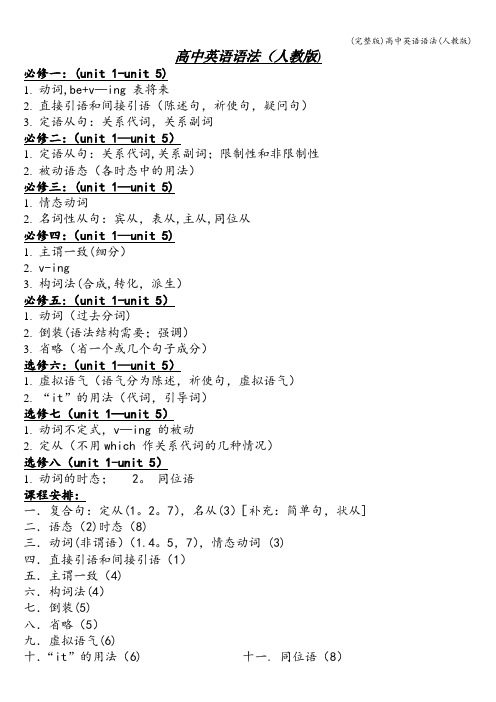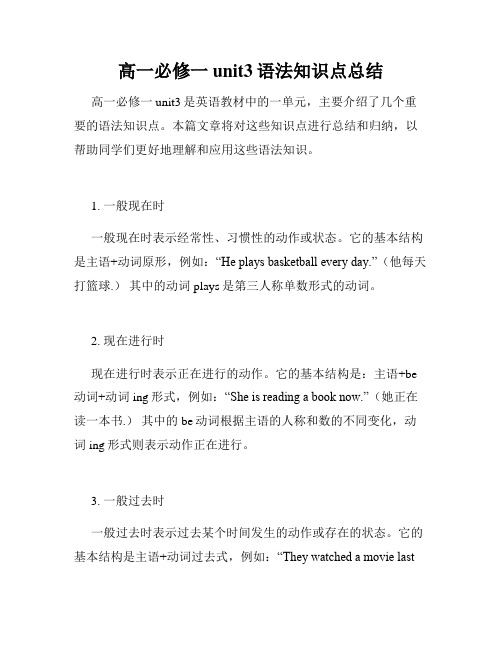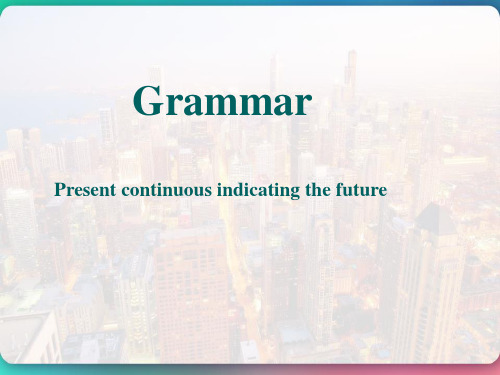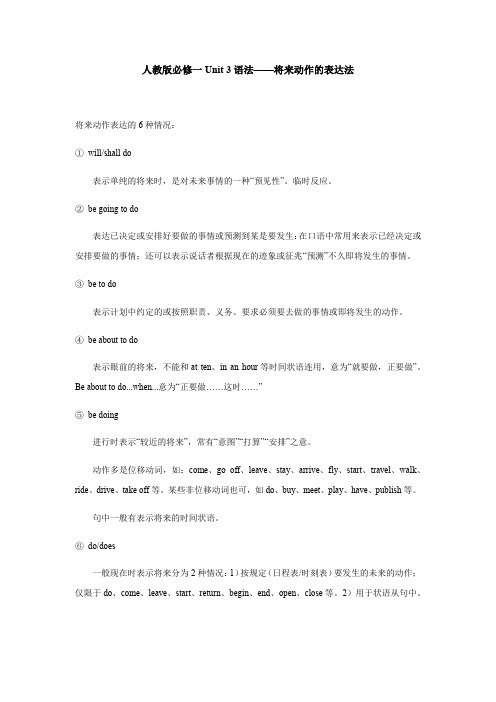高中英语 人教版必修一unit3语法 将来动作的表达方法
(完整版)高中英语语法(人教版)

(完整版)高中英语语法(人教版)
高中英语语法(人教版)
必修一:(unit 1-unit 5)
1.动词,be+v—ing 表将来
2.直接引语和间接引语(陈述句,祈使句,疑问句)
3.定语从句:关系代词,关系副词
必修二:(unit 1—unit 5)
1.定语从句:关系代词,关系副词;限制性和非限制性
2.被动语态(各时态中的用法)
必修三:(unit 1—unit 5)
1.情态动词
2.名词性从句:宾从,表从,主从,同位从
必修四:(unit 1—unit 5)
1.主谓一致(细分)
2.v-ing
3.构词法(合成,转化,派生)
必修五:(unit 1-unit 5)
1.动词(过去分词)
2.倒装(语法结构需要;强调)
3.省略(省一个或几个句子成分)
选修六:(unit 1—unit 5)
1.虚拟语气(语气分为陈述,祈使句,虚拟语气)
2.“it”的用法(代词,引导词)
选修七(unit 1—unit 5)
1.动词不定式,v—ing 的被动
2.定从(不用which 作关系代词的几种情况)
选修八(unit 1-unit 5)
1.动词的时态; 2。
同位语
课程安排:
一.复合句:定从(1。
2。
7),名从(3)[补充:简单句,状从]
二.语态(2)时态(8)
三.动词(非谓语)(1.4。
5,7),情态动词 (3)
四.直接引语和间接引语(1)
五.主谓一致(4)
六.构词法(4)
七.倒装(5)
八.省略(5)
九.虚拟语气(6)
十.“it”的用法(6) 十一. 同位语(8)。
人教版高中英语 语法复习:必修1Unit3语法剖析

语法复习:必修1Unit3语法剖析现在进行时表将来1.概要当句子涉及确切的计划、明确的意图和为将来安排好的活动时,现在进行时可用于表示将来,表示将来意义的现在进行时根据句中表示时间的词语或上下文来确定。
表示将来用进行时的小口诀:巧记歌诀进行时,很好记:be加“动词ing”。
be表时态是“现在”,be要随着主语易。
某点阶段用进行,动词必是延续性,动词若是非延续,最近将来时常用。
2.表现在形式现在进行表将来,通常为:is+v.-ing注意:come, go, stay, arrive和leave等动词的现在进行时经常用于表示将来确切的计划。
表示交通方式、行程安排的动词。
如:fly, walk, ride, drive和take (a bus, a taxi等)的现在进行时也经常用于表示将来。
但是,像rain这样的动词的现在进行时通常不表示将来时间,因为一般来说,下雨不是一个事先计划好的事件。
3.现在进行时表示将来问句1)When are you leaving?你什么时候动身?2)How are you going there?你怎样去哪儿?3)Where are you staying?你将待在哪儿?4)How long are you staying there?你将待在那儿多久?5)When are you coming back?你啥时候回来?【活学活用】13.用动词的适当形式填空1)You _______ (stay) with us this weekend.2)We _______ (leave) soon, Mr Lee.3)She thinks he _______ (die).4)They _______ (go) to Shanghai this Friday.5)Tom _______ (come) here next week.6) The train_______ (arrive) in three hours.答案:1)are staying 2)are leaving 3)is dying 4)are going 5)is coming 6) is arriving。
必修一unit3语法表示将来时的结构

1.If they come, we ________ a meeting. A.have B. will have B. C. had D. would have 2.– Let’s go out to play football, shall we? – OK. I ________. A. will coming B. be going to come C. come D. am coming 1.3.He ________ to us as soon as he 2. gets there. 3. A. writes B. has written 4. C. will write D. wrote 5.4. If it ________ tomorrow, we’ll go roller 6. A. doesn’t rain B. won’t rain
一般将来时的6个结构形式:表示将来的动作或状态
②表示有迹象表明将要发生的动作时,要用 be going to It’s so cloudy! It’ s going to rain! 3.be to do表示安排、计划、决定、命令或 注定要发生的事. The bridge is to be built next year. 大桥将在明年修建。 4.be about to do 表示即将发生的动作, 意为:很快,马上 ★不可跟表示将来的时间状语 The meeting is about to begin. 会议马上就开始。 ★重要句式:be about to do…when… 正要干….这时突然…. I was about to go out when the telephone rang.
人教版高一英语必修一Unit3现在进行时表将来课件

pleasant journey. Thank you for your time.
现在进行时be doing表示将来
1) come, go, stay, arrive, leave 等位置移动的趋 向动词的现在进行时经常用于表示将来确切的 计划。
go, arrive, leave, return等。 --- I’m going to the States. --- How long are you staying in the States? -- 我要去美国。 -- 你打算在美国呆多久?
2)有些非移动性的动词也可用进行时来表示
将来意义,如:see, do, have, meet, get等。
R: Miss Wang, I hear that you _a_r_e_t_r_a_v_e_l_li_n_g
(travel) along the Mekong River. Have you got everything ready? W: Almost.
R: So when _a_r_e_ you _l_e_a_v_in__g(leave)?
husband to visit our friend.
A. How are you getting there? B. I’m driving there.
现在进行时可以表示按计划或安排即将 发生的动作,常有“意图”、“安排” 或“打算”的含义。
summary
现在进行时除表示正在进行的动作之外, 还可表示将来,常有“意图”、“安排” 或“打算”的含义。
最新人教版高一英语必修一Unit-3-语法知识分享

Homework:
• Page 21 on your book: exercise 2
Thank You!
L/O/G/O
此课件下载可自行编辑修改,仅供参考! 感谢您的支持,我们努力做得更好! 谢谢!
人教版高一英语必修一Unit-3-语法
REVIEW
主语+be +v-ing形式
I
I → am He → is She → is
It → is We → are They → are You → are
Listen! She ilsislistteennisng to the music. We are ppllaayyitnhge basketball.
③ be to+动词原形:表示按计划要发生的事 或征求对方意见。 Are we to go on with this work?
④ be about to+动词原形,表示即将发生 的动作,不与表示将来的时间状语连用。
I was about to go swimming when my guide shouted at me and told me not to do so. 我正要去游泳, 这时向导大声叫我不要 去。
⑤ 一般现在时表示将来时 (1) 按规定预计要发生的未来动作,仅限于
动词come, go, leave, move, start, return, arrive, begin, stay等动词. The plane takes off at 10:10. That is, it’s leaving in ten minutes.
(2) 用在状语从句中用一般现在时代替将来时。 If you do that again, I’ll hit you.
高一必修一unit3语法知识点总结

高一必修一unit3语法知识点总结高一必修一unit3是英语教材中的一单元,主要介绍了几个重要的语法知识点。
本篇文章将对这些知识点进行总结和归纳,以帮助同学们更好地理解和应用这些语法知识。
1. 一般现在时一般现在时表示经常性、习惯性的动作或状态。
它的基本结构是主语+动词原形,例如:“He plays basketball every day.”(他每天打篮球.)其中的动词plays是第三人称单数形式的动词。
2. 现在进行时现在进行时表示正在进行的动作。
它的基本结构是:主语+be 动词+动词ing形式,例如:“She is reading a book now.”(她正在读一本书.)其中的be动词根据主语的人称和数的不同变化,动词ing形式则表示动作正在进行。
3. 一般过去时一般过去时表示过去某个时间发生的动作或存在的状态。
它的基本结构是主语+动词过去式,例如:“They watched a movie lastnight.”(他们昨晚看了一场电影.)过去式的构成形式有规则变化和不规则变化,需要根据具体的动词来确定。
4. 过去进行时过去进行时表示过去某个时间正在进行的动作。
它的基本结构是:was/were+动词ing形式,例如:“I was studying when he called me.”(他给我打电话的时候,我正在学习.)过去进行时的be动词形式根据主语的人称和数的不同变化,动词ing形式则表示过去进行的动作。
5. 一般将来时一般将来时表示将要发生的动作或存在的状态。
它的基本结构是:will/shall+动词原形,例如:“I will go to Beijing next week.”(我下周将去北京.)不同的人称和数有不同的构成形式。
6. 现在完成时现在完成时表示过去某个时间开始的动作一直延续到现在,或者过去发生的动作对现在产生的影响。
它的基本结构是:have/has+动词过去分词,例如:“I have lived here for ten years.”(我住在这里已经十年了.) have/has的形式根据主语的人称和数的不同变化,动词过去分词则表示动作已经完成。
高一上学期英语:必修一 unit3 Grammar用现在进行时表示将来 PPT

表以后的时态其他方法:
• He will write you a letter next week、 • We’re not going to have any classes
next week、 • The next train leaves at 9:15、
以后
Can you notice any difference?
1) 位移动词:e, go, start, stay, arrive, leave 等。 2) 某些非转移动词:
What are you doing tomorrow? My father is buying me a bike soon、 3) 含有“决心”的意思,多用于否定结构中: I’m not going there、 I’m not waiting for him any longer、
Ex、 2 (p21)
• are travelling, are…leaving, are…cycling, are taking, are…staying, are taking
• We are taking out insurance to cover any problems、
投保/办理保险
travel, fly, walk, ride, drive, take (a bus, a taxi)
start, give, sleep, play, do, get, meet…
The Present Continuous Tense: expressing the future
• 表示较近的以后,常有“意图”、“安排”、或 “打算”的含义。这种用法比较生动,给人一种期 待感。
• She’s always changing her mind、
高中英语 人教版必修一Unit 3语法-将来动作的表达法(知识点+习题+答案)

人教版必修一Unit 3语法——将来动作的表达法将来动作表达的6种情况:①will/shall do表示单纯的将来时,是对未来事情的一种“预见性”。
临时反应。
②be going to do表达已决定或安排好要做的事情或预测到某是要发生:在口语中常用来表示已经决定或安排要做的事情;还可以表示说话者根据现在的迹象或征兆“预测”不久即将发生的事情。
③be to do表示计划中约定的或按照职责、义务、要求必须要去做的事情或即将发生的动作。
④be about to do表示眼前的将来,不能和at ten、in an hour等时间状语连用,意为“就要做,正要做”。
Be about to do...when...意为“正要做……这时……”⑤be doing进行时表示“较近的将来”,常有“意图”“打算”“安排”之意。
动作多是位移动词,如:come、go off、leave、stay、arrive、fly、start、travel、walk、ride、drive、take off等。
某些非位移动词也可,如do、buy、meet、play、have、publish等。
句中一般有表示将来的时间状语。
⑥do/does一般现在时表示将来分为2种情况:1)按规定(日程表/时刻表)要发生的未来的动作;仅限于do、come、leave、start、return、begin、end、open、close等。
2)用于状语从句中。
Exercises一、单项选择1.The students have been working hard on their lessons and their efforts _____ with success in the end.A.rewarded B.were rewarded C.will reward D.will be rewarded 2.No decision ________ unless all the employers have settled their differences.A.will be madeB.was madeC.is being madeD.has been made3.Jenny ________on holiday now. I wonder when she ________back.A.is being ; comesB.is ; is comingC.will be ; will come4.Flight BA 2793 _____ at 8:20. Hurry up!A.leavesB.leftC.has leftD.leaving5.-Do you have any plans for tonight?-Yes ,I _____ at the new Italian restaurant in town.A.eatB.have eatenC.ateD.am going to eat6.— I hope there _______ less pressure on us today.— If so, we _______ enjoy a more pleasant life.A.is; canB.will be; canC.will be; shouldD.is; should7.The summer holidays______,so the twins as well as Jack are going to Hong Kong for vacation.A.is comingB.are comingese8.If we ______ take environmental problems seriously, the earth ______ worse and worse.A.don’t; won’t beB.won’t; isn’tC.won’t; isD.don’t; will be9.We ______ have a picnic together with our teachers next Thursday.A.are goingB.are going toC.will goingD.may going to10.Just go down this road and you _______ the library next to the bank.A.seeB.sawC.have seenD.will see11.I think it is true that Jill _______ to work today because she is on a trip.A.has comeB.didn’t comeC.is comingD.will not come12.There _____a folk music concert in Xinjiang Opera Theater next month.A.is going to haveB.will haveC.isD.is going to be13.--The weather report says that it___ tomorrow in most parts of Anshun city.--If it ________ , the school sports meet will be canceled.A.will rain; will rainB.will rain; rainsC.rains; will rainD.rains; rains 14.The TV news reports that there ________ a storm the day after tomorrowA.isB.wasC.will beD.has be15.What do you think ______ to John if he finds his bike has been stolen?A.will happen B.happened C.to have happened D.to happen 16.—What are you doing on Saturday morning?—Well,it's going to be sunny,so I ____________ a picnic with my friend.A.have B.had C.have had D.·am having17.My pictures ______ until next Friday.A.won't develop B.aren't developed C.don't develop D.won' t be developed 18.What do you think________to make himself________?A.Bob will say,believeB.will Bob say, believeC.Bob will say, believedD.will Bob say, believed19.Many scientists believe that robots __________ able to talk like humans in 50 years.A.were B.are C.will be D.have been20.There __________ a football game in our city next week.A.will have B.will be C.is going to have D.are going to be21.If you make progress in Spoken English, ____ in Written English.A.so do you B.so are you C.so will you D.so did you22.There ______a basketball match in our school this afternoon.A.will have B.will be C.is going to have D.will has23.I don't know when he back. Please tell me when he back.A.comes, comes B.comes, will come C.will come, comes D.will come, come二、用所给词的正确形式填空24.I ___ for the United States for further study next month.(leave)25.I’ve won a holiday for a week to Guilin. I ___ my wife and little daughter.(take)26.---Tonny is off to Hong Kong tomorrow?(see) ---Who___ him off?27.---What are Mr. and Mrs.Black doing?(drink) ---They ___ tea in the garden.28.---Anny, you ___ books about. Look, what a mess in your study!(throw) ---Sorry, Mom. I won’t do that again.29.Look at the timetable. Hurry up! Flight 4026___off at 18:20. (take)30.Ladies and gentlemen, please fasten your seat belts. The plane ____ off.(take) 31.Look, dark clouds. It ___ rain.(go)32.Send my best wishes to your wife when you ___ home.(write)33.---Do you know when he ___ again? ---Sorry, I don’t know. But when he ___ , I’ll let you know.(come)单句语法填空34.We ________ (leave) very early so we packed our bags the night before.35.By February next year the foreign expert ________ (be) here on this job for five years. 36.I heard that you had got the visa for a short-term visit to the UK this summer. You ________ (experience) a different culture then.37.Look at the timetable!Hurry up!Flight 4026 ________ (take) off at 18:20.38.Some students were busy in arranging tables in the room where a party ________ (hold).39.He promised that he ________ (join) us in the party,but he hasn’t turned up until now. 40.By next month,Tommy ________ (save) enough for a used car.41.Our car ________ (go) at the present speed until it reaches Qingdao at about nine o’clock tonight.42.I ________ (lock) the door and leave when you called me yesterday.43.— What about going shopping tomorrow afternoon? — Sorry. I ________ (take) a yoga class then.三、选用适当的单词或短语补全句子44.(1)He ________________________(go)for a walk when his mother went back.(2)No one ________________________(leave)the classroom until the work is done. (3)—Why are you so hurried?—Look at the clouds!It ________________________ rain.45.(1)Look at those black clouds. There ________(be)a storm.(2)—Did you tell Julia about the result?—Oh,no,I forgot. I ________(call)her right now.(3)My wife and I ________(leave)for London next week.(4)The plane ________(leave)at 8 pm,so I have to be at the airport by 7:00 at the latest.四、根据所给汉语意思完成句子46.完成句子①She ___________________________ next month. 她将于下个月结婚。
- 1、下载文档前请自行甄别文档内容的完整性,平台不提供额外的编辑、内容补充、找答案等附加服务。
- 2、"仅部分预览"的文档,不可在线预览部分如存在完整性等问题,可反馈申请退款(可完整预览的文档不适用该条件!)。
- 3、如文档侵犯您的权益,请联系客服反馈,我们会尽快为您处理(人工客服工作时间:9:00-18:30)。
Unit3 将来动作的表达方法
一、现在进行时表示将来(表示按计划或安排即将发生的动作,常有“意图,安排,打算”的含义)
1、表示从一个地方运动到另一个地方的动词,或者表示交通方式、行程安排的动词可以用现在进行时表将来,此时动词多为位移动词,如come, go,start,arrive,leave,stay,return,fly,drive,walk,take等They are coming here this afternoon.
I'm leaving tomorrow.我准备明天离开。
Are you staying here till next week?
2、现在进行表将来除使用位移动词以外,也可使用某些非位移动词,如play,do,have, get,work, see,wear, spend,buy,meet等。
What are you doing next Sunday? 下周日你打算做什么?
My mother is buying me a bike soon.我妈妈不久将给我买一辆自行车。
I'm meeting you after class. 课后我要找你。
二、将来动作的其他表达方法
1、will/shall do 表达单纯的将来,表示对未来事情发生的“预见性”。
Will用于各种人称,shall一般用于
第一人称。
He will come to see me next month.
2、be to do表示受人们意志控制的,预定、按计划或安排将发生的某事,还可用于表示命中注定会发生的事,
有时也表示命令、禁止或可能性。
I'm to finish the work this evening.我必须今晚昨晚这件工作。
No one is to leave without the teacher's permission. 未经老师许可,谁也不许离开。
3、一般现在时表示将来时有两种情况。
(1)常用于按计划、按规定、或是按照时刻表要进行的动作,常用于一些位移动词,如
go,come,leave,start,stay,return,take,begin等。
The plane takes off at 10:10. That is ,it's leaving in ten minutes.
School begins on September 1.
(2)状语从句中用一般现在时表将来。
在以when,after,as soon as等引导的时间状语从句以及以if,unless等引导的条件状语从句中,如果主句是一般将来时或表示将来意义时,从句则用一般现在时。
We will go to the park, if it doesn't rain tomorrow.
I will give him the letter an soon as I see him.
4、be about to do表示马上要发生的动作,“刚要,正要”,不能与表示将来的时间状语连用。
常用于
be about to do.....when....句型,意为“正要做........这时......”
I was just about to leave the room when someone called me up.我正要离开房间,这时有人给我打电话。
I was about to swim when my guide shouted at me and told me not to do so.
5、be going to do表示近期或事先经过考虑要发生的事情,以及有迹象表明要发生的事情。
I am going to sell this old car and buy a new one. 我打算卖掉这辆旧车,买辆新车。
